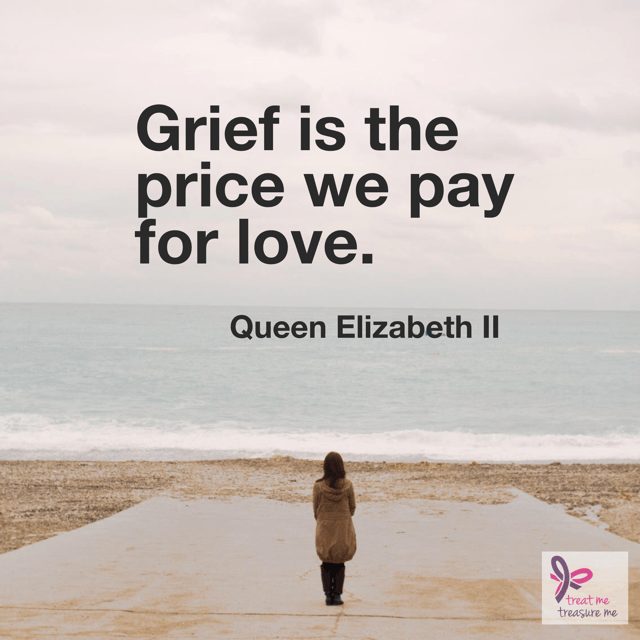Grief and Loss – it’s about far more than dying or bereavement
When we are talking about illness, any talk of grief and loss tends to make people uncomfortable! They wonder if, maybe, we shouldn’t talk about it because it all seems a bit presumptuous, negative or grim. The thing is that grief and loss relates to far more things than dying and bereavement. When we think about it, grief is the emotion we feel when something is lost, or that we believe we might lose in the future. A lot of the time, that emotion is sadness; but it can also be fear, anxiety, insecurity or anger; there is really no specific recipe.
Feelings of loss and grief can stem from many places
In illness, people feel many losses, and that can happen right from when the diagnosis first hits. There’s losing the freedom of not having to think about your health or taking the future for granted. Then your body or mind might feel and look differently. You may have lost, literally, a part of your body such as a breast, hair or a limb. Things may look or feel different, perhaps your weight has changed, your libido has crashed, your calm persona has deserted you or you don’t feel the same physical sensations that you used to. These are all things that you might grieve, feel sad about or wish hadn’t happened. Of course, grief can also be about losing someone we love or care about. The relationship we had with that person, how they died, whether we expected it to happen, if we got an opportunity to say and do what we wanted to and whether we could commemorate the loss all have a big impact on how that loss affects us inside, and how we express that distress to others.
Grief is expressed in many different ways
When humans grieve, there’s no formula for how we express our complex feelings. As a society, we often expect grief to be all about tears, or wanting to be alone (or not wanting to be alone). Grief is more complex and unpredictable than that. It can also be a very physical, as well as an emotional experience. Some people say that grief is, literally, painful. When it is intense, it affects sleeping and eating and causes problems like stomach upsets and headaches. Does grief get better over time? Usually, yes, but…. The idea of stages is outdated now. We know that grief comes in waves; sometimes the waves are so strong they feel as if they knock you over and you can’t catch your breath or might never ‘come up for air’. Other times, the waves are small, gentle. But waves are unpredictable and can come when you least expect it. Grief doesn’t really read a timetable. Some people adjust to loss in months; others may be years. Ideas like being “over it” are not helpful. In grief and loss, we tend to live with it, knowing it’s there, but keeping on living. Are we ever OK about losing a breast, or losing our partner, parent, sibling…? No. The losses are very different, and have differing intensities, but loss is loss and grief is grief.
So how can you help yourself or someone else cope with it all?
- First of all, don’t judge
- Accept that everyone is different, and they may not react as you or others might
- They may deeply feel the loss of something that may not appear to matter to others
- Listen, spend time with them if that’s what they want
- Take the pressure off them to “seem OK” especially when out in public, it’s really, really hard
- Don’t go on about them “doing well” or “not doing so well” – who chose the measuring tape?
- Do practical things; offer to shop for wigs or hats, look at scars if they offer to show you, talk about what they have been facing, cook a meal, pay a bill, take them where they want to go
- Don’t freak out with tears, or other emotions. Maybe they get angry, let some things go when you can
- Exercise helps. Nutrition helps, making small plans for the future helps (not necessarily “things to look forward to” – looking forward is really hard when we feel lost, broken and insecure
- Be sensitive to triggers, the anniversary of a diagnosis, wedding, death. Birthdays
- Be sensitive to comments; your lovely new top/haircut/relationship/holiday might be hard to bear for someone else
- Understand and tolerate that the little things others may focus on may seem trivial and ridiculous when something so big has happened.
Just be there and take it gently
This list is not a shopping list! You know yourself or the person you care about. Think about what would help you or someone else – don’t over think it, just try. Being there is the most important thing; physically if that’s possible, emotionally, spiritually; just try to take their perspective and understand what this loss could feel like. If it’s happened to you; be kind to yourself. Grieving the loss of things that matter is a difficult thing to do and your reaction and healing won’t read a calendar. That’s OK. What we hope for is that, over time, the waves get less intense and happen less often or, hopefully both. But to quote the Queen (!), grief is the price we pay for love. Losing something or someone we have loved is a wound and licking our emotional wounds takes time.


